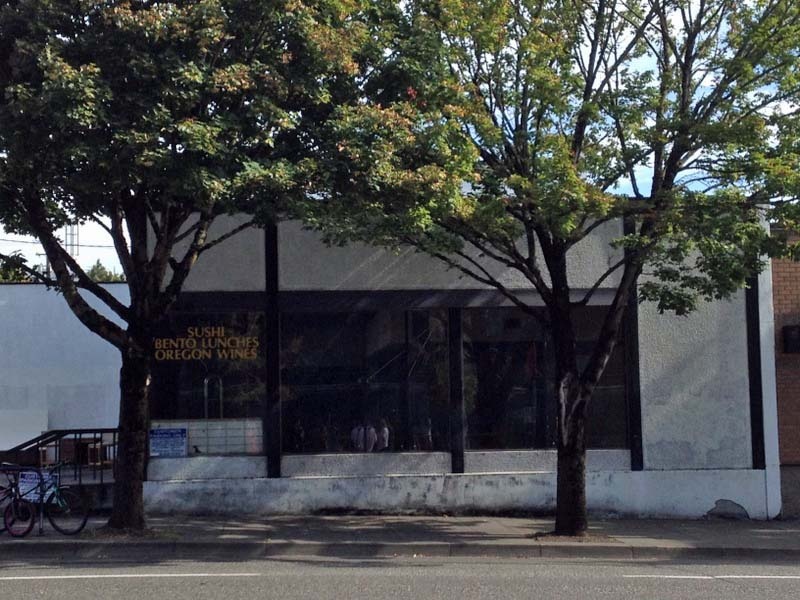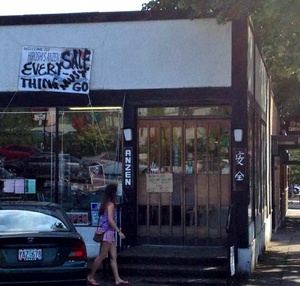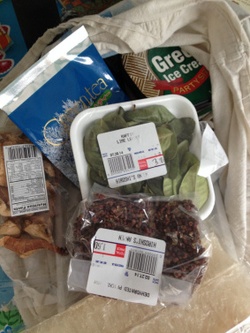When you opened the wood embellished glass door of Hiroshi’s Anzen grocery store, you could smell fish. Fermented fish, salted or dried fish products, and decades of fresh fish sold off of ice, leaving tiny pieces of their guts and scales in the drains and stuck to out of the way places on the floor. Inside you got the silage whiff of pickles, a taste of dust mixed with incense, and the particular scent of cardboard imported from Asia. My 8-year-old was revolted by the smell and insisted on waiting in the car. It’s not quite the smell of the Chinese groceries of my own youth, which smelled more like fermented beans, sugar, and garlic. But it is a nose and lungful of connection to the past.
Anzen shut down as last summer ended. The owner, Hiroshi Matsushima, was 75. After having grown up in the store his grandfather first opened in 1909, and worked in it for 60 years, he was tired. As the store liquidated its inventory, he sat by the cash register in a plastic lawn chair, sometimes with a friend. As customers picked through the colanders and soup spoons marked down 50%, the old men chatted, “what are you going to do with the sign?” “Oh my son wants it. My kids fight over it. They both want the one written in Japanese.”
The signs were two carved vertical wooden plaques on either side of the double front doors, one with the kanji “An Zen,” the other reading “ANZEN” in block letters.
Their stain and paint were faded. They watched over the three southbound lanes of NE Martin Luther King Boulevard for a long time. Traffic goes by quickly on MLK and also on northbound Grand Ave that passes the parking lot on the back of the building. The weathered cinderblock grocery building sits across from the shiny convention center that hosts dance contests, craft fairs, and comic book conventions. There is a “For Lease” sign on the building now, but who knows how long before someone buys the lot and puts up a new hotel, like city planners have been talking about for years for the convention center district.
For many years, Anzen was the inside secret for Portland sushi chefs and Japanese families who wanted to get “the real thing”. In addition to all the different kinds of seaweed, rice, frozen fish, and premium tuna, they sold spices, pickles, and all of the brightly colored, heavily packaged sweet and salty snacks from across the ocean. They had a selection of music, magazines, and videos from Japan as well, and table top and hanging lanterns for sale lined the windows. Next to the shelves of porcelain soup bowls you could also find wooden soled sandals and the seamed, padded cotton belts used for judo, karate, or aikido uniforms. There was a rack of kimonos, gardening aprons, and cooking tunics. A glass case held fine knives and ornamental vases.
As the store closed, Mr. Matsushima donated some of the groceries and sold some at a discount. The warren of aisles in the back that made the store look bigger on the inside than the outside became crowded with empty magazine racks and unused hand trucks. The big scale sat unused on one of the shelves. A few boxes of fish sauce, noodles, and curry powder were left near the freezer case.
Anzen means “safe” in Japanese. I don’t know if the name predated the family’s “free government vacation” during World War II, or if they named the store when they returned to Portland to find Japantown gone. It seems likely that the store in its final location was there longer than the street had been named after the late civil rights leader. But competition from bigger, newer Asian groceries on the outskirts of town gradually made the store less of a destination. And Mr. Matsushima wanted to spend more time with his family.
So people drifted through at the end, hoping to get a bargain on pruning shears or a wind chime. The meager selection of candy is mostly M&M’s and KitKats now. I filled a bag with paper lanterns, bright orange masago, frozen octopus, desiccated ginger and pepper, and freezer burned green tea ice cream. Sadly, I couldn’t take the smell home with me.
*This article was originally published on the author’s blog, rage. creation – joy, on February 3, 2015.
© 2015 Elleanor Chin





